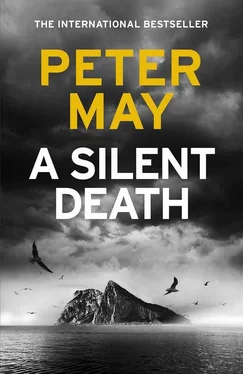‘I think the Jefe already made that clear.’
‘You’re lucky he didn’t throw you into the harbour.’
Mackenzie pressed his lips into a grim line.
‘I think he likes you,’ she said, and Mackenzie turned a look of surprise in her direction. She flicked him a glance. ‘God knows why.’
The Nissan SUV was parked at the top of the steps which had been Cleland’s escape route from the port. As she opened the driver’s door Cristina said, ‘Are you hungry?’
Mackenzie nodded.
‘Well, you’ll have to wait. I have to go into Estepona first and call in on my aunt. We can grab something to eat afterwards.’
Ana’s excitement is palpable. It consumes her every thought, fills her physical being. It is a feeling she has not known in all the years since the shutters came down on her world. A feeling that brings back hope, like stumbling upon water unexpectedly in a desert. A feeling that perhaps life might just be worth rekindling.
Her fingertips tingle from the braille that she has read and reread on her screen. He will not have heard her voice, and she has no idea how it might have sounded to the operator who passed it on in text on a screen. Whether she spoke too loudly, or too softly, or if it still has that husky little catch that always surprised her when she replayed a recording of it. Something she never heard herself in real time.
Had the operator, she wonders, discerned at all the emotion conveyed in the brief exchange of words for which she had been the conduit?
Sergio’s call was so unexpected, so undreamt of, Ana still finds it hard to believe it really happened. All those years ago she had been able to hear his voice, and now has to imagine it from the patterns that raise themselves beneath her fingertips, capable only of drawing its rich soft cadences from recollection. Whatever hesitation it might have contained was impossible to interpret from the braille. Whatever apprehension lost for ever in the ether. Just his words in cold, hard little dots.
‘Hello, Ana. It’s Sergio.’
She had responded to the call, prompted by the buzzer that vibrated at her breast. Never, in any lifetime, expecting to read those words. At first she had been at a loss as to how to respond.
‘Sergio?’ Which had seemed so inadequate, given how laden this call was with its own history.
‘I want to say sorry to you a million times over, Ana. But not in a phone call.’
No words had come. She had sat frozen with disbelief, then fear that somehow this was some wicked hoax. It was more than twenty years since they had last spoken.
‘I have only now discovered where you are living. I cannot believe it. All this time, and only a few streets away. Oh, Ana, say you’ll see me. Let me come and tell you myself. You owe me nothing, I know. But I owe you everything. Not least an explanation. I could come later this afternoon, or early this evening. It depends when I can get away from work. Please, Ana.’
Finally she had found her inner voice and let it speak through the operator. ‘I’m not going anywhere, Sergio. And even if I could there’s nowhere for me to go.’
‘I’ll come as soon as I can. I’ll tell you everything then.’
And so the call had ended, leaving her to thrash about in a sea of emotions, drowning in her own past.
Ana remembered the first time she ever set eyes on Sergio. He had not immediately endeared himself to her.
It was 1997. She was in her final year at secondary school and facing an uncertain future. The hearing problems which had dogged her from early childhood were getting worse. School had been a hostile environment. As her auditory perception deteriorated and she was forced to wear hearing aids, so the friendships she had made in the early years fell by the wayside. One by one. No one wanted to be friends with a girl who couldn’t hear, as if they too might be tainted by her disability. It wasn’t cool . It made her seem stupid, and slow. Besties became bullies, playing tricks on her behind her back, indulging the apparently endless capacity of children for cruelty. Relentless mimicry, humiliation. And her tearful response only encouraged further ridicule, somehow whipping former friends into a frenzy of heartlessness.
Her teachers were just as bad, or perhaps worse, since they were at least adults. Their cruelty came more in the form of thoughtless neglect than cold-hearted design. Ana had been refused a place at a special needs school. Her hearing deficiency was not deemed serious enough, and from the earliest age the only concession to her problem was to place her in a seat at the front of the class. Her teachers would then proceed to address the others over her head, or speak while facing the blackboard, so that Ana could not even read their lips.
For Ana herself it had resulted in slower than average progress and disparaging report cards.
Ana doesn’t pay attention.
Ana is clever, but she just doesn’t try.
Ana is lazy.
Ana doesn’t do her homework.
So unfair! Ana only ever missed her homework when it was delivered verbally to class, and she either misunderstood, or didn’t hear at all. Not one of her teachers took the trouble to write it down for her, or ensure that she understood what was being asked. She was just an irritation, an additional problem they didn’t need. A lumpen girl who sat at the front of the class. A girl who never responded, never participated, failed her exams and forgot her homework.
A girl who ached inside, hiding her misery and her loneliness from the world — even from her parents.
Her father was loving in his own way, but hardly ever there. A travelling salesman, he spent days on end, sometimes weeks, away from their home in a small apartment in Marviña old town, leaving Ana in the sole care of her mother. Although her mother came from a poor working-class family in a village in Catalonia, she had a certain conceit of herself, and always stood on her dignity. She adored Ana’s elder sister, Isabella, who was everything Ana was not. Pretty, clever, socially adept. And the ten-year age difference between the girls meant that they had virtually nothing in common, sharing very little of the childhoods that were always at very different stages of development. By the time Ana was nearing the end of secondary school, Isabella was already married with two young girls of her own.
Ana was viewed almost with embarrassment by her mother, as if her deafness were somehow her own fault, contrived to reflect shame on her family. When her husband was away she frequently chastised her daughter for failing to listen or understand, shouting at her quite unnecessarily when Ana was perfectly able to hear. Then, overcome with regret, she would smother the girl with love and tears, only to revert to type when Ana next frustrated her.
It was with some trepidation that Ana received the news her father brought home with him one night that he had obtained a place for her at a voluntary centre for the deaf in Estepona. Her mother was none too pleased either. It would be like announcing to the world, she said, that their daughter was disabled. Ana herself was less than happy. She was hard of hearing, she said, not deaf. But her dad had been insistent. The centre was run by a charity, but received government money in the form of a grant from the Junta de Andalucía . They provided facilities for the visually impaired, as well as the — and he chose his words carefully — hard of hearing. But it meant that Ana would get the opportunity to learn sign language, and that could only be a good thing. Ana was not so sure.
The centre was tucked away in a back street off the Plaza de las Flores in the old town of Estepona. Ana’s father drove her there on the first evening. After parking his car he took her by the hand and led her through the square up into a gloomy side street. ‘I’ll come and get you at nine, cielo ,’ he said. ‘If you like it, you can get the bus next time.’ The centre was open three evenings a week, but Ana didn’t think there would be a next time.
Читать дальше












